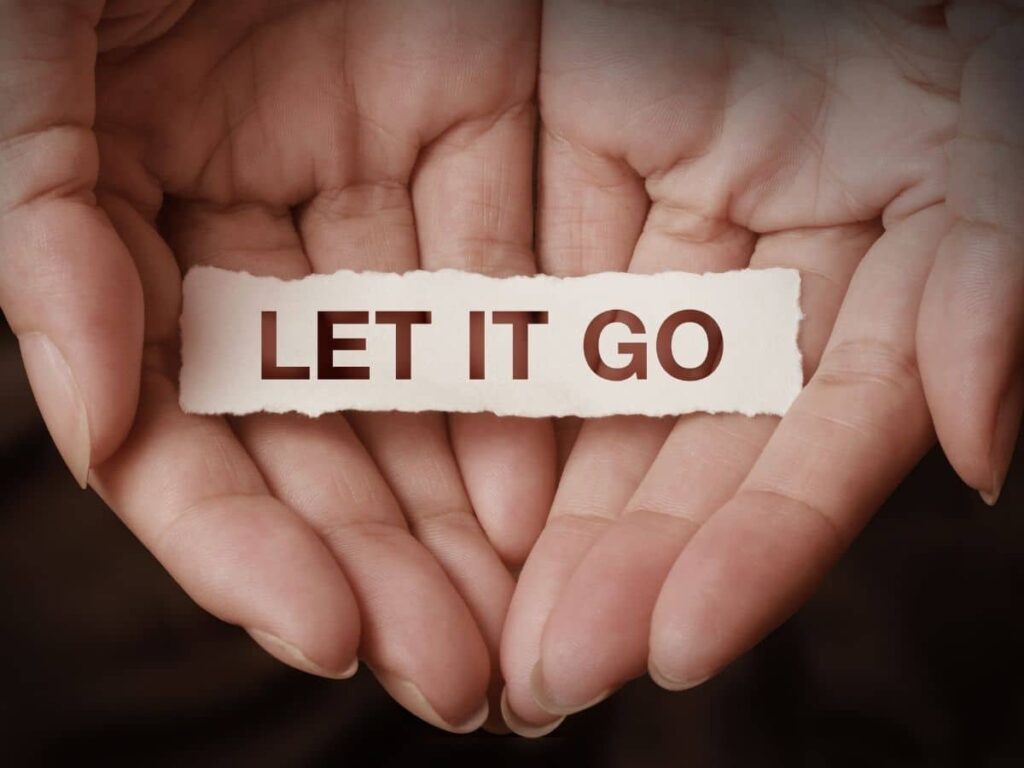Last Updated on January 26, 2022
In his book, Looking for Alaska, John Green said, “The only way out of the labyrinth of suffering is to forgive.” When you forgive, you free up your energy and allow yourself to move on. This is not to say that you should forget what happened, but rather, that you should find a way to accept it and learn from it. The problem is, while you may be quite generous in your forgiveness of others, you may be much harder on yourself.

Forgiving ourselves can be difficult, but it is worth the effort. Self-forgiveness is self-care, which can lead to healthier relationships and a more peaceful life. Take small steps in forgiving yourself for past mistakes, like facing the truth, acknowledging the guilt, trying a new perspective, setting realistic goals or expectations, and even writing to yourself with kind words. Talk to yourself as you would with a friend.
I know from personal experience that forgiving yourself can be difficult, but it is worth the effort. When I was going through a tough time, I found it helpful to write down my thoughts and feelings in a journal. This allowed me to understand myself better and work through my emotions. It also helped me to keep track of my progress.
Learning about sustainability can cause a lot of guilt for our previous actions. Maybe we left styrofoam cups in a parking lot, littered, washed a lot of glitter down the drain, and those actions harmed marine life and there’s a lot of guilt that can come from things we did before we knew better. And, we have to forgive ourselves and move on to do better in the future.
Table of Contents
why should I forgive myself?
You should forgive yourself for several reasons. First, forgiving yourself allows you to let go of the past, which allows you to focus on the present and future. When you forgive your mistakes, you create an opportunity to move on with your life.
Another reason why we forgive ourselves is because it’s healthy. Forgiveness is a form of self-care, and it can be beneficial for our mental and physical health. Forgiving yourself can also improve your relationships with others.
Research from Stanford University has shown that those who practice self-forgiveness have more positive attitudes and healthier relationships with higher levels of success, productivity, focus, and concentration.
Carole Pertofsky, director emerita of Stanford’s student wellness services, even said that self-forgiving people recognize that a lack of self-forgiveness leads to suffering, “They are kind to themselves, which reduces their anxiety and related depression.”

how do I forgive myself?
Take small steps to forgive yourself. You can start by acknowledging your mistakes and allowing yourself to be imperfect. Make forgiveness a positive experience and not a negative one.
Forgiving yourself for past mistakes means learning from them. For example: if you lost a job because you were late to work every day the previous month, make a plan to be on time the next month. This is just one example of how you can learn from your mistakes. You can also practice self-forgiveness by following these practical tips:
- Face hard truths.
Acknowledge what you need to forgive yourself for. Facing what you have done or what has happened is the first step toward self-forgiveness. Moral faults call for remorse or guilt, and unskillfulness requires correction, such as a pledge not to repeat certain acts.
- Realize the difference between guilt and shame.
Not feeling great about doing something bad is healthy and natural. We feel guilty when we behave in a way we regret, and this can lead us to course-correct and become more deliberate in our words, actions, and thoughts. Shame is accompanied by defensive feelings like denial, avoidance, and violence.
- Try a new perspective.
Every day, take time to reflect on the good things you’ve done and acknowledge the positive impact you’ve had. Sometimes we remember all the mistakes or issues, but don’t always remember the good things.
- Set realistic goals or expectations.
Know your strengths, your weaknesses, and your resources so you can focus on achieving your goals without creating undue stress and anxiety for yourself and others.
- Write yourself an apology.
When you start to forgive mistakes, find strength in knowing that it doesn’t define you. Most importantly, remember to shower yourself with kind words. “Rather than ruminating or lashing yourself with guilt, practice self-compassion, which involves soothing and coaching yourself as you would with a good friend,” says Dr. Ellen Hendriksen, a clinical psychologist and author of How To Be Yourself: Quiet Your Inner Critic And Rise Above Social Anxiety.”
important reminders on forgiveness
If you are having a hard time forgiving yourself, here are a few reminders that might help in your journey:
- Give yourself some time. Forgiving ourselves does not happen overnight. It takes time and effort.
- Acknowledge your feelings. Accept that you are feeling angry, sad, or frustrated. Do not try to suppress your feelings. Forgiveness can come from a place of understanding and compassion.
- Forgive yourself for your own sake, not to appease others. If you have hurt someone else but do not want to apologize because it will be too difficult, you can still go through the process of forgiving yourself to free yourself from the negative emotions associated with your actions.
- Forgiveness is a personal journey. Forgiving others may be empowering, but forgiving yourself should only be done if it feels right for you. If you do not feel ready to forgive yourself, that is okay. You can work on forgiving yourself at your own pace.
- Seek professional help if you need it. If you are struggling to forgive yourself and find it difficult to move on, it might be helpful to seek professional help. A therapist can provide you with guidance and support as you work through your emotions.

FAQs: forgiving oneself
what if i do not think that i should forgive myself?
Some people think that they do not deserve forgiveness from themselves because they equate forgiveness with an apology or a pardon. However, forgiveness is the internal work of understanding and accepting your mistakes, learning from them, and letting go of the past. You do not have to seek anyone’s approval in order for it to be a valid choice.
why is it so important to forgive myself?
Forgiving yourself is an act of self-care. You are releasing the negative emotions that you have been holding on to so that you can move forward in a healthier way.
what if i hurt other people?
If you have caused harm to another person, whether it was intentional or not, it will be more difficult for them to forgive you, even if you forgive yourself. You can address the situation by making amends, or taking steps to ensure that you will not hurt anyone in the same way again.
if i forgive myself, will i be punished?
No. You will not be punished for forgiving yourself. In fact, by forgiving yourself, you are opening yourself up to greater peace and happiness.













